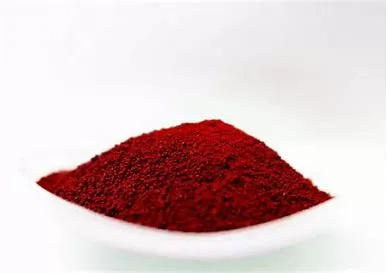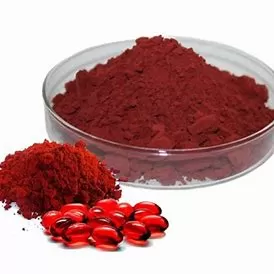- 0086-571-85302990
- sales@greenskybio.com
Does astaxanthin affect sleep?
2025-05-30
Sleep plays a pivotal role in overall health and well-being, affecting everything from cognitive function to physical performance. As such, finding natural compounds that can potentially enhance sleep quality is of significant interest to researchers and health enthusiasts alike. Astaxanthin, a powerful antioxidant derived from microalgae and responsible for the pink-orange color in salmon and shrimp, has become a subject of study for its wide array of health benefits. This article examines whether Astaxanthin could influence sleep quality and duration, and explores the science behind its effects on the body.
Understanding Astaxanthin
Astaxanthin is a naturally occurring carotenoid, a class of pigments that provide coloration in various plants and animals. It is praised for its potent antioxidant properties, which are significantly stronger than those of other well-known antioxidants, such as vitamin C or vitamin E. The health benefits of astaxanthin are diverse and include potential anti-inflammatory effects, improvement in skin health, and support for heart and eye health. But how does it relate to sleep?
The Role of Antioxidants in Sleep
Oxidative stress—a condition characterized by an imbalance between free radicals and antioxidants in the body—has been linked to various health issues, including sleep disorders. When oxidative stress occurs, it can impact the central nervous system and contribute to sleep disruptions. In this context, antioxidants like astaxanthin may play a role in mitigating oxidative stress, thereby positively influencing sleep quality.
Astaxanthin’s ability to cross the blood-brain barrier suggests that it could exert direct effects on the brain, potentially impacting neurological processes associated with sleep. By reducing oxidative stress and inflammation, astaxanthin may help create an environment more conducive to restful sleep.
Astaxanthin’s Anti-Inflammatory Properties
Chronic inflammation has been identified as a factor that can disrupt sleep patterns. Pro-inflammatory cytokines are believed to interfere with the body’s natural sleep-wake cycles, contributing to insomnia and other sleep disorders. Astaxanthin’s anti-inflammatory properties, which have been documented in several studies, could theoretically help balance these cytokines and promote better sleep.
For example, research published in the journal "Nutrients" found that astaxanthin supplementation reduced markers of oxidative stress and inflammation in a group of patients with metabolic syndrome. While this study did not specifically address sleep, the reduction in inflammation markers is a promising indicator that astaxanthin may support improved sleep indirectly.
Psychological Factors and Sleep
Stress and anxiety are common psychological barriers to achieving good sleep. The antioxidant and anti-inflammatory effects of astaxanthin may also support mental health. Some studies suggest that astaxanthin could have a role in reducing stress and anxiety, potentially leading to better sleep outcomes.
For instance, a study investigating the effects of astaxanthin supplementation noted improvements in mental clarity and overall mood among participants. A reduction in stress and anxiety levels can directly contribute to improved sleep quality by promoting relaxation and facilitating the body’s natural transition into the restorative phases of sleep.
Direct Studies on Astaxanthin and Sleep
Direct studies specifically investigating astaxanthin's effects on sleep are limited. However, anecdotal reports and emerging research highlight a potential link worth exploring further. The need for well-designed clinical trials to explicitly address the impact of astaxanthin on sleep quality remains crucial to validate these initial findings.
As the dietary supplement market grows, the need for rigorous scientific scrutiny into each component's effects becomes increasingly important, particularly for compounds like astaxanthin that hold significant therapeutic promise.
Incorporating Astaxanthin into Your Routine
For those considering astaxanthin supplementation with the hopes of improving sleep, it is advisable to adopt a holistic approach to sleep health. This includes maintaining a regular sleep schedule, creating a comfortable sleep environment, and adopting healthy lifestyle habits like regular exercise and stress management techniques.
Astaxanthin supplements are generally considered safe when taken in appropriate dosages, yet it is critical to consult with healthcare professionals before starting any supplement, particularly for individuals with pre-existing health conditions or those taking other medications. Balancing supplementation with a diet rich in various nutrients can ensure that any potential benefits of astaxanthin are maximized within a supportive health framework.
Conclusion
While astaxanthin's powerful antioxidant and anti-inflammatory properties suggest potential benefits for sleep, direct scientific evidence on its efficacy in improving sleep quality is still emerging. However, its role in reducing oxidative stress and inflammation provides a plausible basis for further exploration into its effects on sleep.
As research continues to unravel astaxanthin’s comprehensive health benefits, its role in supporting sleep should be included in future studies. In the meantime, those interested in its potential advantages may consider incorporating it as part of a broader strategy for improving overall health and well-being, including sleep.
Understanding that sleep health is multifaceted and influenced by various physiological, psychological, and environmental factors is vital. As part of an integrated approach to health, astaxanthin may offer supportive benefits that contribute to a restful and rejuvenating night’s sleep.
-
Which food has the highest astaxanthin?
2025-05-30
-
Why is astaxanthin so expensive?
2025-05-30
-
What are the benefits of astaxanthin?
2025-05-30
-
What is astaxanthin made from?
2025-05-30














